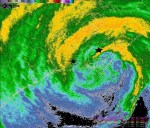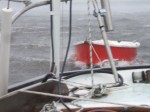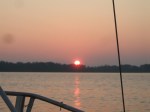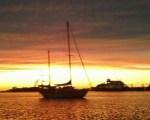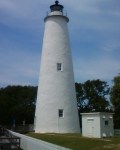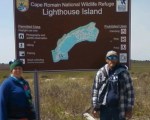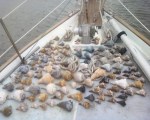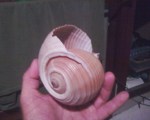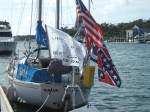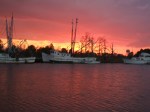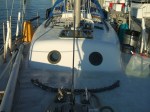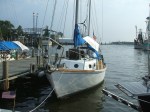MASTER AND COMMANDER
“Red in the morning, sailors take warning.” Every sailor remembers those words from his childhood, but what does “light rain in the morning” forewarn? That is what I was destined to find out for myself as a wet, gray dawn broke the Maryland sky one May morning.
I had my 27 foot sailboat “Soulshine” ready for a 105 mile trip up the Potomac River to our nation’s capitol.
This trip was to be a first for me in that I had never before attempted to venture so far inland up a river.
I was starting out from Point Lookout Marina in Southern Maryland. I happened upon this out-of-the-way marina — complete with a boatyard, first-class restaurant, picnic area, and beautiful gardens — the same way in which I had ended up at so many other places; by sheer chance.
I was in my mid-twenties and I had been sailing well beyond my means. I was broke and my galley was low on food, so I anchored near to the marina and rowed my dinghy to shore to look for work.
My timing was perfect. It was early May and the busy Chesapeake Bay sailing season was soon to start, so there was a lot of work to be done at the marina.
The owner of the marina was a man in his 70′s named John. He seemed to take a shine to me when I explained my situation — that I was basically just cruising around on my sailboat, stopping for work when I needed money. He offered me a job for a couple of weeks doing basic handy-man work, helping to get the marina ready for the busy season. They pay was not going to be that great, but then, the work was not going to be that hard either. And, bedsides, I would be getting paid in cash and be allowed to tie up to the dock for free. It seemed perfect.
Work started off as good as work can. I was given the simple task of using stencils to paint numbers on the individual slips on the docks. It was going to take a while to finish it — there were a couple of hundred slips, and I had to paint the numbers on each slip twice — once so you could see it as you walked along the dock, and the other so that you could see it from a boat approaching on the water.
I was only a couple of hours into my first day of work when John came to me and told me that he needed me to ride to town with him to get some things. It didn’t seem to me that he really needed my help, but rather that he just wanted some company. John was an old sailboater himself, and like every other sailboater that I’ve ever met, he loved to spin a good yarn. Since John was the boss, he could hijack me from my duties whenever he wanted to, and in fact, it was to become a regular part of my employment.
Over the course of a couple of weeks working at the marina, my labor became a hot commodity. Besides my various assignments from the owner, the boatyard manager was always wanting me to work in the boatyard painting boat bottoms, the owner’s wife wanted me to help with her many flower gardens, and the operator of the marina restaurant wanted me to wash dishes at night. My temporary employment seemed to be in danger of becoming a real job, so I felt that it was time to assert my independence by announcing my intention of sailing to D.C.
I gave four or five days notice of my departure, but since I would be sailing right by the marina on my way back downriver (and most likely be broke as I did so), I agreed to return and finish up the list of assignments that John had for me which I never got around to doing. Now the work was behind me; my pantry was stocked, my cooler was full, and there was cash in my wallet. I was ready to go.
On the morning of my scheduled departure, the temperature was mild and the wind was fair. A slow, steady rain was the only drawback, but I was not going to let a little bit of rain delay me.
Every sailing trip, especially one into unfamiliar waters, comes with varying levels of excitement, anticipation, and trepidation. As I untied my docklines and made my way out to the Potomac River, my mind brought up images that I associated with river sailing: strong currents, floating debris, heavy boat traffic, and narrow waters. At least narrow waters wouldn’t be a problem as I started out — the Potomac River is about seven miles wide at its mouth.
Despite the rain, it was a good day for sailing upriver. The outboard motor on my boat was not very reliable. In fact, it was a piece of junk. But so what! My boat came with sails for a reason, and with the wind direction the way it was that day, I would be sailing downwind.
I got my sails set, turned on the auto-pilot, and then got out of the rain as much as possible. The auto-pilot is a wonderful device — I named mine Gilligan– but it can’t do everything. The way the auto-pilot works is that once I get my boat on the desired course, I engage the auto-pilot, and it moves the tiller as needed to keep the boat headed on the set course. For the auto-pilot to be able to do this, the sails must be set properly and trimmed as the wind shifts. So although the piloting of the boat is hands-free with the auto-pilot engaged, I couldn’t go down below to the cabin to stay completely dry. Besides, I had to keep a lookout for other vessels and adjust my course to follow the channel.
I had planned on two days to get to D.C. I would sail all day the first day and look for a safe place to anchor before it got dark. The following day, I would get up early and finish my trip.
I wanted to make as many miles as possible the first day, so I decided to fly my spinnaker. Flying a spinnaker (a very large, multi-colored sail, also known as a “chute”) is not an easy task, especially when sailing single-handed. In fact, one of my sailing books says that it takes a crew of four. My boat though, was designed to make sailing single-handed easier, and I had some tricks, including my auto-pilot, that made it possible to fly my chute without any crew. Still, I only ever attempt to use it when the wind is light and constant in direction, and when I will not be changing course for a while.
That was the case on this day, so I decided that it was worth the fifteen (or so) minutes that it took to set the chute, and also the extra attention that was required to tend to it.
When all was said and done, the spinnaker was set and flying beautifully. I was kicking back in the cockpit admiring my boat, myself, and my life in general. I was also making great boat speed.
My day was going great. I only had to make minor course changes to follow the channel upriver, and Gilligan was doing a fine job at the helm. The hours and miles were flying by.
Later in the day, while scanning the horizon for markers and boats, etc., I noticed that the mast of a sailboat well behind me, at the limit of my vision. In days gone by, a vessel such a distance was referred to as being “hull down.” As it neared, and the hull of the boat became visible above the horizon, it was said to be “hull up.”
Due to the distance of the boat behind me, and the weather conditions, all I could make of the other boat was that it was a sailboat with no sails raised. I couldn’t guess at the size of the boat, nor its heading, and I really didn’t expect to see much
more of her. If she was heading upriver, like me, then she would have a hard time catching up to me. My spinnaker was still set, and it was pulling me downwind at close to my maximum hull speed.
So imagine my surprise when the mast behind me kept getting taller and taller, meaning that the boat behind me kept getting taller and taller, meaning that the boat behind me was getting closer and closer. I could now make out that it was a two-masted boat, but she remained hull down. As she ate up the distance between us, I began to realize that she was a very large boat. Shoot, she was a ship!
When the ship caught up to me, the Potomac was a couple of miles wide, and she never got closer than a couple of hundred yards to me. Because it was still raining, I couldn’t get a very good look at her as she passed me by. Still, she was close enough that a few things stood out; She was a schooner – a twin masted sailboat in which the foremast is shorter than the aft – or main mast. She was also the largest sailboat that I have ever seen under weigh. She had to have been over 100 feet long!
As the schooner had been catching up to me, I knew that she was moving fast, but now that she was overtaking me, I got to see just how fast. She was going faster than I had ever seen a sailboat go before.
I was sitting out in the rain, trying to get a better look at her though my binoculars, when I heard a call on the V.H.F marine radio.
It was a female voice, and it said, “This is the schooner ‘America’ calling the sloop near (whatever channel marker I was at) on the Potomac River.”
I answered, “Schooner ‘America’, this is ‘Soulshine’… go ahead Capitan.”
She asked me to switch to a working channel, so I did so. (On marine radios, Channel 16 is used for hailing and emergencies only. When you contact your party, you agree on which working channel to switch to. Once on that working channel, you are free to talk all you want to.)
She called me back and said that she just wanted to compliment me on my boat. Then, in a teasing manner, she told me what a pretty color my big sail was — but didn’t my Momma ever teach me to come in out of the rain?
I responded that it was a lot of work to fly that big, pretty colored sail, but I wasn’t going to let a little rain stop me.
Then I said mockingly, “I’ve got to tell you — that’s a beautiful motorboat that you’ve got.”
That got her good!
She got defensive and told me that they had a reservation at midnight for an opening of the I-95 drawbridge near D.C., and that they needed to keep their speed up to be sure to make it on time.
I knew what she meant about the drawbridge. To get them to stop traffic on I-95 and open the drawbridge, you have to make a reservation at least 24 hours in advance, and even then, it will only open between midnight and 6AM.
I didn’t have that concern, though. My mast was not tall enough to need the bridge to open for me to pass under it.
I was told that they would be docking the ‘America’ at the city marina in Alexandria, Va., and that I was invited to stop by for a cocktail.
I thanked her, and told her that I might take her up on her offer. That was about it for our conversation, and the ‘America’ quickly left me behind.
The rest of the day was uneventful. At the end of the day I dropped anchor right off the FBI training center in Quantico, Va., and had a peaceful night.
I awoke the next morning to a beautiful sunny day, and I continued my cruise upriver. I sailed by Mt. Vernon, and as I did so, I blasted my horn (for my lack of a cannon) in a traditional salute to the father of our country. That was kind of cool.
It was early in the afternoon when I made it to Alexandria and saw the ‘America’. When I got to the city docks where she was moored, I saw that there were plenty of empty slips, so I decided to stop by for that cocktail.
I didn’t call the dockmaster for a slip. I wasn’t planning on staying for long, so I didn’t want to have to pay overnight dock fees. If the dockmaster came to me after I tied up, I would deal with it then. It was my time-tested mantra of “It’s sometimes easier to ask forgiveness than it is to ask for permission.”
I got ‘Soulshine’ tied up and walked over to the ‘America’. I introduced myself as the captain of ‘Soulshine’, and I was invited aboard. Once onboard, I met the captain, the lady with whom I had spoken to on the VHF, and some of the crew. I was given a tour and learned about the ship.
She was 139 feet long, and a replica of the 19th century schooner that won the first race that, from that point on, would forever be called “The Americas Cup.”
She was brand-new – built in Albany, NY and just launched. Although she was a replica of a ship originally built in the 1800′s, she was totally modern. She had a fiberglass hull and down below she was amazing. The galley was huge, and came complete with a water-maker, refrigeration, freezers, etc. The staterooms were incredibly nice, and she even had a washer and dryer.
After the tour, we all sat around in her beautiful, round cockpit and had a few drinks. That led to us telling each other extravagant tales of our own sailing adventures.
Quite a few drinks later, I made my way back to my boat. After experiencing the grandeur of the ‘America’, she seemed so small. As I sat there, reflecting back on my conversation with my new friends, one thing really stood out.
Here were these folks on this huge, brand-new, four million dollar vessel. I was told that everyone onboard the ‘America’ had their eyes on my little boat as they passed me by. While they were huddled down below, keeping out of the rain, hurrying to get where they were going, they spotted my spinnaker well ahead of them. When they caught up to me, they saw me sitting out in the rain, seemingly enjoying the hell out of myself, and that’s what prompted them to call me on the radio.
It reminded me of a story that I once heard:
A man and his young son went out on a fishing trip. They were on a small, leaky jon-boat with an old outboard motor, and they were fishingith cheap rods and reels.
As they were fishing, a big, million dollar sportsfishing boat went by. She was a beautiful boat, equipped with thousands of dollars worth or fishing gear. The man in the jon-boat pointed to the big boat and said to his son, “Now that’s fishing.”
At the same moment, in that big sportsfishing boat, was an older man and his grown son. As they slowed down so as to not to rock the little jon-boat too badly, the older man looked down at the tiny boat with the two people onboard, and he was reminded of similar days that he had spent with his own son so many years before. He pointed down to the little boat and said to his son, “Now that’s fishing.”
I had been looking at the ‘America’, jealous of all her amenities, her spaciousness, and of her ability to sail anywhere in the world. Yet at the same time, those onboard the ‘America’ were looking at me and ‘Soulshine’, envying her simplicity and the freedom that I had that only comes when one is master and commander of his own vessel.
The next morning, I made it the final few miles to D.C. I was high on life as I dropped my anchor within sight of the Washington Monument. I had already had a great trip to D.C., and I hadn’t even stepped ashore yet.
For me, that’s the beauty of sailing; the journey can be just as rewarding as is the destination.
THE END




